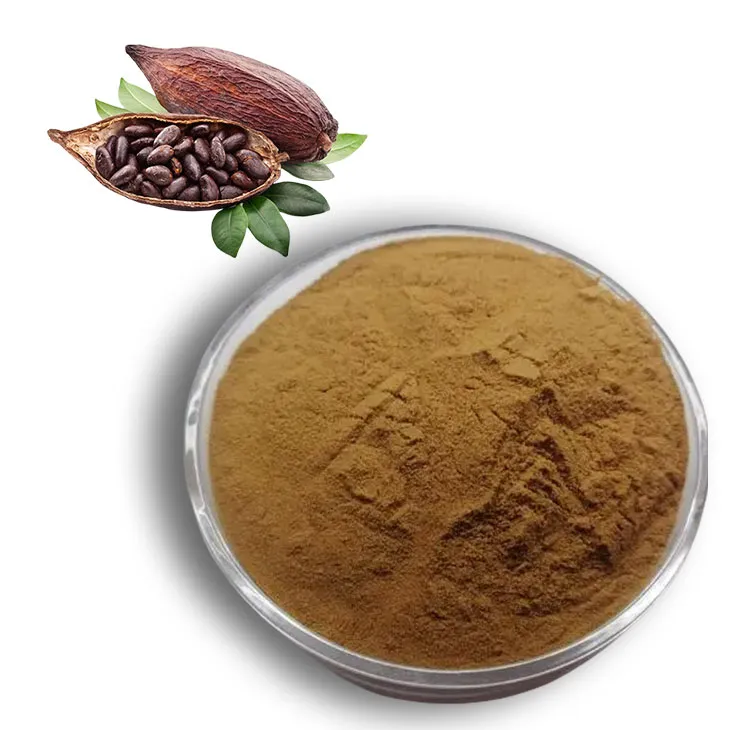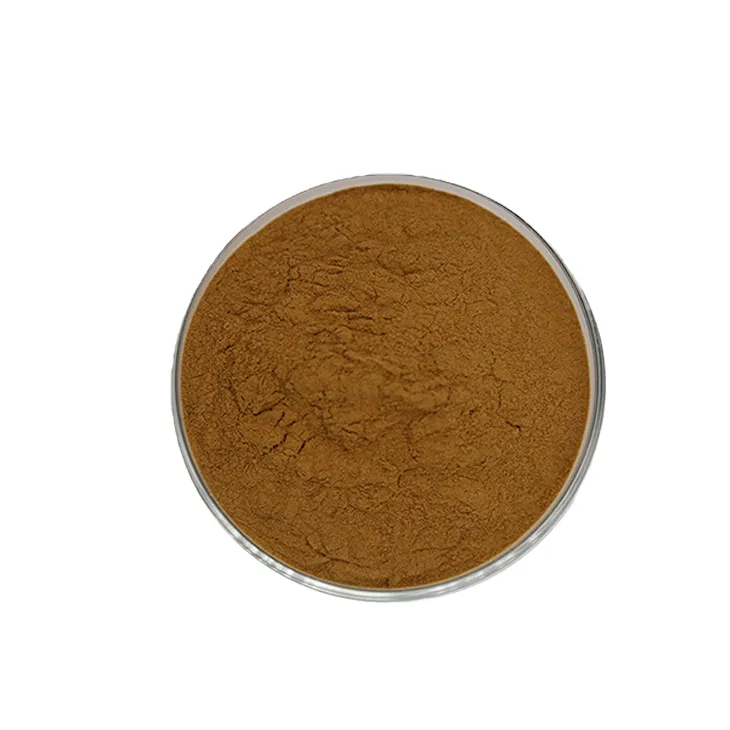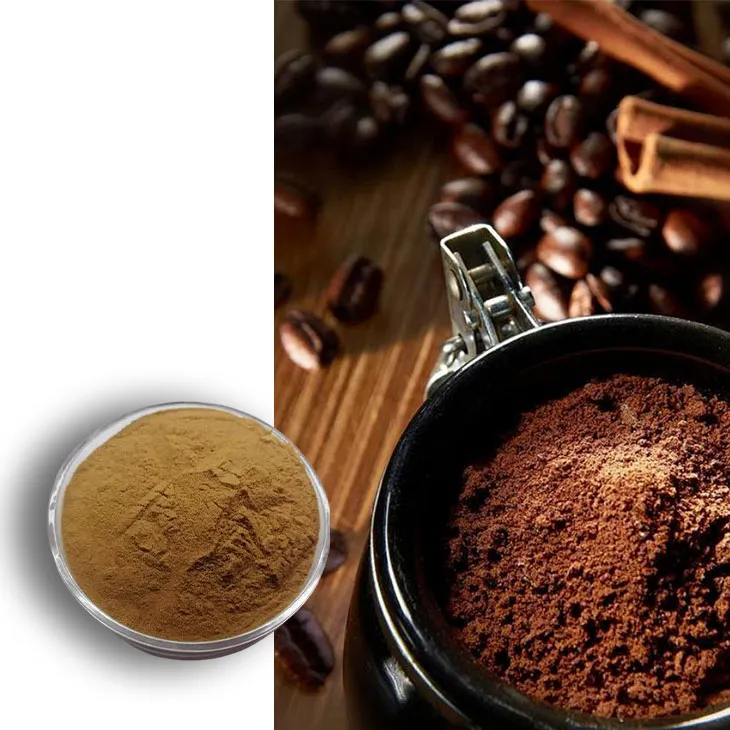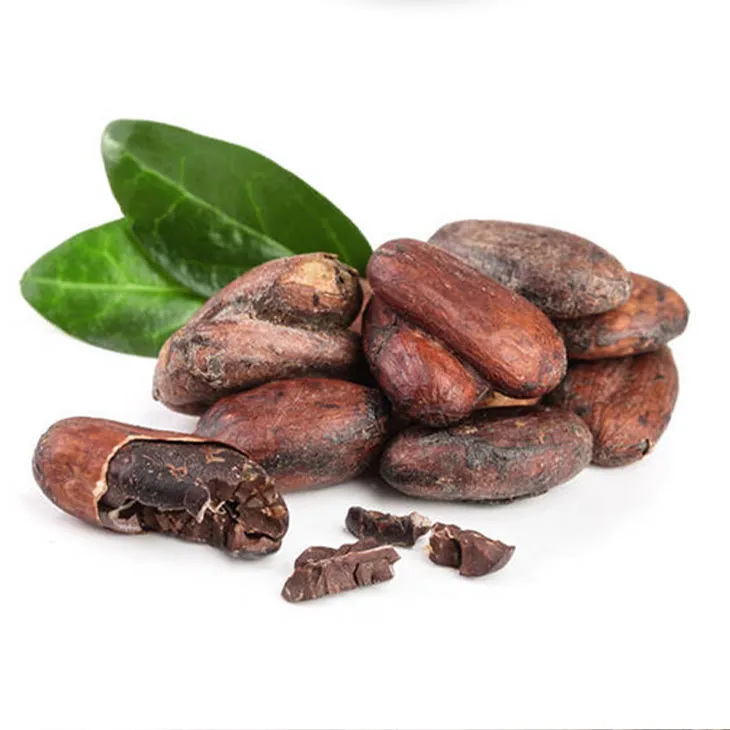- 0086-571-85302990
- sales@greenskybio.com
Bulk purchase of cocoa extract.
2024-12-02

1. Introduction
The purchase of Cocoa Extract in bulk is not a decision to be made lightly. It is a strategic move that can have far - reaching implications for a business. Cocoa Extract, with its rich flavor and numerous health benefits, has found its way into a wide variety of products, from food and beverages to cosmetics and pharmaceuticals. As the demand for cocoa - based products continues to grow, understanding the nuances of bulk purchasing becomes crucial.

2. Market Trends Influencing Bulk Purchases
2.1. Growing Consumer Demand
Consumer demand for cocoa - related products has been on the rise in recent years. Consumers are increasingly interested in products that offer both indulgence and health benefits. Cocoa Extract, rich in antioxidants such as flavonoids, is seen as a desirable ingredient. This growing demand at the consumer level has a direct impact on businesses considering bulk purchases. As the market expands, companies need to ensure they have a stable supply of high - quality cocoa extract to meet the increasing demand for their products.
2.2. Changing Dietary Preferences
Changing dietary preferences also play a role in the market trends. There is a growing preference for plant - based products, and cocoa extract fits well into this trend. It can be used as a natural flavor enhancer and a source of healthy compounds in vegan and vegetarian products. This shift in dietary preferences has led to an increased demand for cocoa extract in new product categories, which in turn affects the bulk purchase decisions of businesses operating in these areas.
2.3. Expansion in the Food and Beverage Industry
The food and beverage industry is constantly evolving, and cocoa extract has become a popular ingredient. In the confectionery sector, it is a staple for chocolates and candies. However, it is also making inroads into other areas such as dairy - free ice creams, energy bars, and flavored coffees. The expansion of the use of cocoa extract in the food and beverage industry is a significant market trend that encourages bulk purchases. Companies need to secure a reliable supply to stay competitive in this dynamic market.
2.4. Growth in the Cosmetics and Pharmaceuticals Sectors
Cocoa extract is also finding applications in the cosmetics and pharmaceuticals sectors. In cosmetics, it is used for its moisturizing and antioxidant properties. In pharmaceuticals, research is being conducted on its potential health benefits, such as its role in cardiovascular health. The growth in these sectors presents new opportunities for cocoa extract suppliers and buyers alike. Businesses considering bulk purchases need to be aware of these emerging trends and factor them into their decision - making process.

3. Understanding the Supply Chain
3.1. Origin of Cocoa Beans
The origin of cocoa beans is a crucial factor in the supply chain. Cocoa is mainly grown in tropical regions such as West Africa, South America, and Southeast Asia. Each region has its own unique characteristics in terms of bean quality, flavor profile, and production methods. For example, cocoa from West Africa is known for its high yield and affordability, while cocoa from South America, particularly from countries like Ecuador and Venezuela, is often prized for its fine flavor. When making a bulk purchase of cocoa extract, understanding the origin of the cocoa beans used in the extract can help ensure the desired quality and flavor are obtained.
3.2. Processing and Extraction Methods
Processing and extraction methods significantly impact the quality of cocoa extract. There are different methods of processing cocoa beans, including the traditional fermenting, drying, and roasting processes. The extraction method can also vary, with options such as solvent extraction and supercritical fluid extraction. Solvent extraction is a common method, but it may leave behind traces of solvents. Supercritical fluid extraction, on the other hand, is a more advanced method that can produce a purer extract. Businesses need to understand these methods and their implications when making bulk purchases to ensure they are getting a high - quality product.
3.3. Logistics and Transportation
Logistics and transportation are vital components of the supply chain. Cocoa beans and cocoa extract need to be transported from the source to the manufacturing facilities in a timely and efficient manner. This involves considerations such as packaging to prevent spoilage, temperature control during transportation (especially for cocoa extract, which can be sensitive to heat and moisture), and choosing the right shipping methods. Delays or improper handling during transportation can lead to a deterioration in the quality of the cocoa extract, making it essential for businesses to have a clear understanding of these aspects when making bulk purchases.
3.4. Supplier Relationships
Establishing strong supplier relationships is key to a successful bulk purchase of cocoa extract. A reliable supplier can ensure a consistent supply of high - quality product, provide timely information about market trends and availability, and may offer more favorable terms such as price discounts for large - volume purchases. Building long - term relationships with suppliers also allows for better communication and the possibility of collaborating on product development or quality improvement initiatives.

4. The Role of Certifications in Ensuring High - Quality Cocoa Extract
4.1. Fairtrade Certification
Fairtrade certification is an important consideration for businesses purchasing cocoa extract in bulk. This certification ensures that cocoa farmers are paid a fair price for their beans, which in turn promotes sustainable farming practices. By choosing Fairtrade - certified cocoa extract, businesses can support ethical sourcing and enhance their corporate social responsibility image. Fairtrade - certified products also often come with certain quality assurances, as the certification process includes strict standards for production and processing.
4.2. Organic Certification
Organic certification is highly sought - after in the cocoa extract market. Organic cocoa is grown without the use of synthetic pesticides, fertilizers, or genetically modified organisms (GMOs). For businesses targeting consumers who prefer organic products, having an organic - certified cocoa extract is essential. Organic certification not only guarantees the purity of the product but also aligns with the growing consumer demand for clean and sustainable food and beverage ingredients.
4.3. Quality Standards and Certifications
There are other quality standards and certifications specific to the cocoa extract industry. These may include certifications related to food safety, such as HACCP (Hazard Analysis and Critical Control Points) and ISO (International Organization for Standardization) standards. These certifications ensure that the cocoa extract meets strict safety and quality requirements, which is crucial for businesses, especially those in the food and beverage, cosmetics, and pharmaceuticals sectors. When making a bulk purchase, it is important to verify that the cocoa extract has the appropriate certifications to avoid potential quality and safety issues.

5. Innovative Uses of Cocoa Extract in Emerging Industries
5.1. Functional Foods and Nutraceuticals
Cocoa extract is being increasingly used in functional foods and nutraceuticals. In functional foods, it can be added to products such as breakfast cereals, yogurt, and energy drinks to provide additional health benefits. In nutraceuticals, which are products that combine the characteristics of food and medicine, cocoa extract is being studied for its potential in preventing chronic diseases such as diabetes and heart disease. The emerging field of functional foods and nutraceuticals offers new opportunities for bulk purchasers of cocoa extract to enter into innovative product categories.
5.2. Bio - based Materials
Another innovative use of cocoa extract is in the development of bio - based materials. Researchers are exploring the use of cocoa extract in creating biodegradable plastics and packaging materials. The natural compounds in cocoa extract can potentially enhance the properties of these materials, such as their strength and flexibility. This emerging application not only provides a new market for cocoa extract but also aligns with the global trend towards more sustainable materials.
5.3. Cosmeceuticals
In the field of cosmeceuticals, which combines cosmetics and pharmaceuticals, cocoa extract has shown great potential. It can be used in products such as anti - aging creams, skin - brightening serums, and hair - care products. The antioxidant and moisturizing properties of cocoa extract make it an attractive ingredient in these high - value products. Businesses involved in the cosmeceutical industry may consider bulk purchases of cocoa extract to take advantage of its growing popularity in this sector.
6. Managing Inventory Effectively When Buying in Large Amounts
6.1. Forecasting Demand
Accurate demand forecasting is the first step in effective inventory management when making bulk purchases of cocoa extract. This involves analyzing historical sales data, market trends, and upcoming product launches. By accurately predicting the demand for products containing cocoa extract, businesses can avoid overstocking or understocking. For example, if a company is planning to launch a new line of cocoa - flavored energy bars, it needs to forecast the potential demand for these bars to determine the appropriate amount of cocoa extract to purchase in bulk.
6.2. Storage Conditions
Proper storage conditions are crucial for maintaining the quality of cocoa extract in inventory. Cocoa extract should be stored in a cool, dry place, away from direct sunlight and sources of heat and moisture. In addition, it should be stored in appropriate packaging to prevent oxidation and spoilage. Businesses need to invest in proper storage facilities and regularly monitor the storage conditions to ensure the long - term quality of their cocoa extract inventory.
6.3. Inventory Rotation
Implementing an effective inventory rotation system is essential. This means using the oldest inventory first to prevent product spoilage. By following the first - in - first - out (FIFO) principle, businesses can ensure that their cocoa extract inventory remains fresh and of high quality. Regular inventory audits can help identify any slow - moving inventory and take appropriate action, such as offering promotions or adjusting production schedules.
6.4. Safety Stock
Maintaining a safety stock is also an important aspect of inventory management. A safety stock is a buffer inventory that can be used in case of unexpected increases in demand or supply disruptions. When making bulk purchases of cocoa extract, businesses need to calculate an appropriate safety stock level based on factors such as lead time from suppliers, historical demand variability, and the criticality of cocoa extract in their production processes.
7. Conclusion
In conclusion, the bulk purchase of cocoa extract is a complex decision that involves considering multiple factors. Market trends, understanding the supply chain, the role of certifications, innovative uses in emerging industries, and effective inventory management all play important roles. By carefully analyzing these aspects, businesses can make informed decisions when purchasing cocoa extract in bulk, ensuring a stable supply of high - quality product to meet their production needs and stay competitive in the market.
FAQ:
What are the current market trends for cocoa extract?
The market trends for cocoa extract can be influenced by various factors. There has been an increasing demand for high - quality cocoa extract due to the growing popularity of natural and healthy products. Consumers are more aware of the potential health benefits of cocoa, such as antioxidants. Also, the trend in the food and beverage industry towards using natural flavors and ingredients has boosted the demand for cocoa extract. In the cosmetic and pharmaceutical industries, there is a rising interest in cocoa extract for its potential skin - care and medicinal properties, which also affects the market trends.
Why is understanding the supply chain important when buying cocoa extract in bulk?
Understanding the supply chain is crucial when buying cocoa extract in bulk. Firstly, it helps in ensuring a consistent supply. Knowledge of the origin of the cocoa beans, the processing methods, and the transportation routes can prevent potential shortages or delays. Secondly, it allows for better quality control. By understanding each step in the supply chain, businesses can trace the source of the cocoa extract and verify its authenticity and quality. Thirdly, it can have cost - saving implications. Identifying inefficiencies or potential risks in the supply chain can help in negotiating better prices and terms with suppliers.
What certifications should one look for when purchasing high - quality cocoa extract?
When purchasing high - quality cocoa extract, several certifications are important. One of the key certifications is Fairtrade. This ensures that the cocoa farmers are paid fairly and work under good conditions. Organic certification is also crucial as it guarantees that the cocoa beans are grown without the use of synthetic pesticides and fertilizers. Another relevant certification could be Rainforest Alliance Certified, which indicates that the cocoa production is environmentally sustainable and socially responsible. These certifications not only ensure the quality of the cocoa extract but also contribute to ethical and sustainable business practices.
What are the innovative uses of cocoa extract in emerging industries?
In emerging industries, cocoa extract has several innovative uses. In the nutraceutical industry, it is being explored for its potential in developing dietary supplements due to its rich nutrient profile. In the biotech industry, there are studies on using cocoa extract for its bioactive compounds in drug development. In the functional food area, cocoa extract is being used to create products with added health benefits, such as enhanced heart health or improved cognitive function. Additionally, in the beauty and personal care industry, cocoa extract is being incorporated into products like anti - aging creams and hair conditioners for its moisturizing and antioxidant properties.
How can one effectively manage inventory when buying cocoa extract in bulk?
Effectively managing inventory when buying cocoa extract in bulk involves several strategies. Firstly, accurate forecasting of demand is essential. This requires analyzing historical sales data, market trends, and customer behavior. Secondly, proper storage conditions need to be maintained to ensure the quality of the cocoa extract. This includes controlling temperature, humidity, and light exposure. Thirdly, implementing a first - in - first - out (FIFO) system can help prevent spoilage of older stock. Regular inventory audits should also be carried out to identify any discrepancies or potential issues early on.
Related literature
- The Cocoa Extract Market: Trends and Forecasts"
- "Supply Chain Management in the Cocoa Industry"
- "Certifications in the Cocoa Extract Market: Quality and Sustainability"
- "Innovative Applications of Cocoa Extract in New Industries"
- "Inventory Management for Bulk Purchasing of Food Ingredients"
- ▶ Hesperidin
- ▶ Citrus Bioflavonoids
- ▶ Plant Extract
- ▶ lycopene
- ▶ Diosmin
- ▶ Grape seed extract
- ▶ Sea buckthorn Juice Powder
- ▶ Fruit Juice Powder
- ▶ Hops Extract
- ▶ Artichoke Extract
- ▶ Mushroom extract
- ▶ Astaxanthin
- ▶ Green Tea Extract
- ▶ Curcumin
- ▶ Horse Chestnut Extract
- ▶ Other Product
- ▶ Boswellia Serrata Extract
- ▶ Resveratrol
- ▶ Marigold Extract
- ▶ Grape Leaf Extract
- ▶ New Product
- ▶ Aminolevulinic acid
- ▶ Cranberry Extract
- ▶ Red Yeast Rice
- ▶ Red Wine Extract
-
Sophora Japonica Flower Extract
2024-12-02
-
Calendula Extract
2024-12-02
-
Yellow Pine Extract
2024-12-02
-
Phyllanthus Emblica Extract
2024-12-02
-
Citrus Aurantii Extract
2024-12-02
-
Acerola Juice Powder
2024-12-02
-
Ivy Extract
2024-12-02
-
Panax Ginseng Leaf Extract
2024-12-02
-
Lemon Extract
2024-12-02
-
Nettle Root Extract
2024-12-02





















